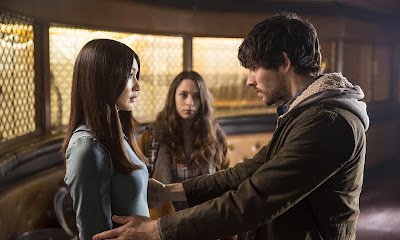Well, I didn’t particularly care for this one. But Gillian Flynn, in case you didn't know (which I didn't), is the author of the book and then film adaption Gone Girl and I don't think my opinion will effect her career at all so I'll just go ahead and tell you all how I really feel about the story...not that I normally hold back anything anyway, now that I think about it.
What Do You Do? is the
story of a woman who was raised poor and taught to beg, but now makes a pretty
good living for herself through less than reputable means. She goes from begging with
her mother to working in the sex industry to moving laterally into the front
office as a psychic/con artist. And while the narrator believes that she
is a con artist in this respect, there are hints throughout the story that she is
perhaps more than she seems, as she is able to see and feel auras and can give
detailed descriptions of strangers’ personal characteristics. One of her front office customers, a
woman named Susan, expresses her fear that something is wrong with her ‘evil’
stepson, potentially stemming from the ‘evil’ house they just moved into. The
narrator sees an opportunity in this and agrees to help by coming to ‘cleanse’
the house twice a week for 6 months and $1200. While in the house the narrator encounters the Eddie
Munster-like stepson who releases blood curling screams, threatens to kill her,
and vomits in her purse. So far, what we’ve got here is a fast-paced and easily
readable recount of an X-Files episode. So yadda yadda blood on the wall and all
the usual stuff and then BAM! A twist! Stepson corners the narrator and
explains that really, it’s Susan who wants to kill her because she found out
that she was giving hand-jobs to her husband Mike (who happens to be our
narrator’s favorite client) and now Susan is coming after narrator and stepson
since she hates the stepson because, ya know, child of anotha motha.
This twist is full of holes and not at all
believable. I mean, what working professional basically single parent (dad’s
always traveling you see…well, at least when he’s not off getting hand jobs)
has time to go to flea markets and rummage through boxes of old pictures until they find
one with a family of four with a boy who looks like stepson and then use that
picture to create a fake website full of fake history that will come up readily
in an online search for their house? Not to mention, why did the kid puke in our
narrator’s purse? Oh right, because he thought it would be fun to go on with
the ruse for a while. Yeah, that’s believable. Anyway.
So our narrator buys this BS and ‘rescues’ stepson from now evil Susan
and wait, what’s that? It’s another twist! Thats right, we have now gone from the short
story version of an X-Files episode to the short story version of an M. Night
Shymallama film. Oh yaaaaaaaaay.
Anyway, so the second twist turns out that stepson really
is evil. Well, maybe not evil, but he’s definitely a little shit. He’s the one
who found out about dad, he’s the one who made the website, and he may have cut
off the cat’s tail but we’re not sure because the cat may have been a Manx.
And
now he’s playing the ‘you’re a kidnapper and I can get out of the car and make
a phone call and you won’t leave because you’re a kidnapper now’ card. Which
makes no sense to me. The explanation given for why our trusty narrator doesn’t
just pop this kid in the face and go on her merry way is that since she engages
in less than reputable employment opportunities she must have a criminal record
so no one will believe her side of the story if he turns her in for being a
kidnapper. Okay, perhaps this is true, but….how is he going to turn her in? He
doesn’t even know her real name. I don’t even know her real name. Susan
probably doesn’t even know her real name. She’s already quit giving hand jobs
pretty much and I don’t think a person who has made their living begging and
conning and hand jobbing is really worried about having to quit her job as a
phony(ish) psychic to avoid being found. I don’t buy any of this.
The worst part of it all is that our narrator is quite a
good character. Sure, she engages in acts that may not be
the most socially acceptable, but since when has that been a reliable judge of
character? She makes a good living for herself. She’s hard working, ambitious,
and smart. She has control over her own destiny…or did at least until twist
number two. Now, all of a sudden, all of her agency is lost. She is unable AND
unwilling to get herself out of this (minor IMO) situation and spends the last
few pages of the story trying to convince herself to allow this fool to
manipulate her and to like her new situation, instead of trying to get herself out of it.
So all in all, What Do You Do? is probably worth skipping.
It’s very well written, don’t get me wrong. It's an engrossing and fast-paced
read, but the whole story is just contrived, in every definition of the word. The only thing that saves this story is that it's short, so I only really had time to get slightly annoyed after 40 pages rather than extremely infuriated after suffering through 400.
The Math
Baseline Assessment: 5/10
Bonuses: +1 for writing style, which really was quite good.
Baseline Assessment: 5/10
Bonuses: +1 for writing style, which really was quite good.
Penalties: -1 for taking away narrator's agency, -1 for leaving way too many holes in the story to make the twists and the narrator's acceptance of the explanations even remotely believable
Nerd Coefficient: 4/10 (not very good)
Previous: Tough Times All Over by Joe Abercrombie
-----
Posted by: Tia who is currently discovering the joy of the short story anthology
Reference: Flynn, Gillian. What Do You Do? From: Rogues, Eds. George R. R. Martin and Gardner Dozois [Bantam Spectra, 2014]



































